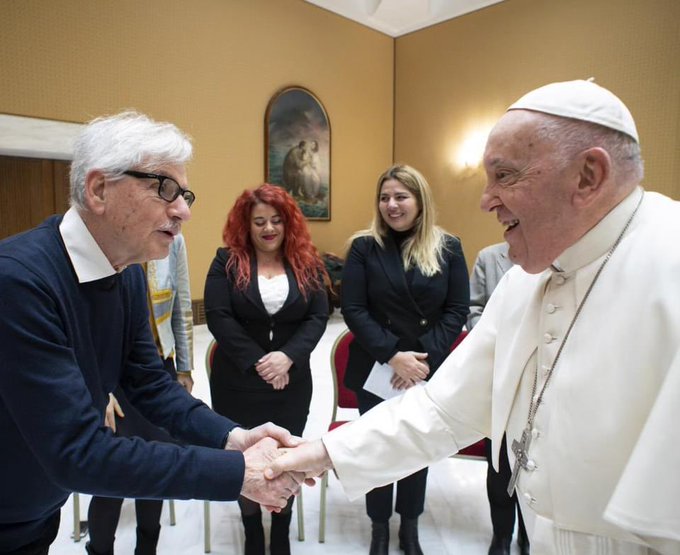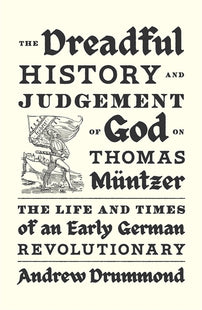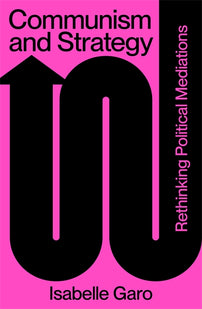To the Vatican with red flags
On 10 January 2024, Pope Francis received a private audience with a delegation of people who had been participating for several years in a dialogue between Marxists and Christians. Michael Löwy, who was in attendance, recounts the experience in detail.

This article was originally published on 10 January 2024 by Mediapart.
In 2014, Pope Francis met Alexis Tsipras and Walter Baier, representatives of the European Left, along with Franz Kronreif of the Christian Focolare movement. With Bergoglio’s agreement, a process of dialogue began between Marxists, represented by the Transform! network of European left-wing foundations, and Christians, represented by the Focolare movement. Focolare does not have a left-wing identity, but their mission, in the spirit of the Second Vatican Council, is to engage in dialogue with secular cultures. An association was set up, DIALOP, which has organised several seminars at Focolare’s Sofia University Centre in Lopiano (Italy), a summer university on the island of Syros (Greece), and a joint declaration, drafted by Micha Brie, of the Rosa Luxemburg Foundation in Berlin, and Benni Callebaut, of the Sofia University Centre, signed by dozens of people of both persuasions.
Finally, on 10 January 2024, Pope Francis received in private audience a delegation arising from this dialogue, made up of seven personalities linked to the Focolare movement (including Franz Kronreif and Luisa Sello) and eight Marxists linked to the Transform! network, including Walter Baier, current president of the European Left Party, Cornelia Hildebrandt, from the Rosa Luxemburg Foundation in Berlin, José Manuel Pureza, from the Left Bloc in Portugal, and the author of this note. Also present was a young Frenchwoman, Thérèse du Sarte, from Anastasis, a left-wing Christian collective. Walter Baier and Franz Kronreif presented Francis with a small gift: a book containing photographs of indigenous peoples – the guardians of the forests and of our common home, Mother Earth.
The Pontiff read a message of welcome to those present, in which he expressed his support for dialogue between Marxists and Christians, not without making an ironic gesture meaning ‘Difficult, isn’t it?’ Dialogue was possible because both sought to ‘promote the common good’.
Addressing the two groups, he made a surprising appeal, using an expression from his native country: ‘We Argentines say no te arrugues, “don’t be discouraged”. This is also my invitation to you. Don’t get discouraged, don’t give up, don’t stop dreaming of a better world.’ Quoting verbatim from the great values of the French Revolution, he added: ‘Countless times in recent years, great dreams of freedom and equality, of dignity and fraternity, reflecting the dream of God himself, have brought progress and breakthroughs.’
[book-strip index="1"]
The Argentinian Pope suggested three attitudes to the participants: break with old patterns, look after the most disadvantaged, and fight corruption while respecting the law.
Regarding the second suggestion, he affirmed a principle that undoubtedly corresponds to the nonconformist spirit of his pontificate: ‘A civilisation is measured by the way it treats the most vulnerable: the poor, the unemployed, the homeless, immigrants, the exploited, and all those whom the culture of waste transforms into refuse. A policy that truly serves humanity cannot be dictated by finance and market mechanisms.’ Solidarity, he insisted, ‘is not only a moral virtue, but also a demand for justice’ that implies ‘radical changes of perspective’. Those who take on this commitment, said Francis, are ‘social poets’, because they ‘put creativity at the service of society, to make it more human and more fraternal’.
The reading of this message was followed by an informal conversation between the Pope and the participants, during which they discussed subjects such as the place of women in the Church – ‘they already head the Curia’, declared the Pontiff –, the murderous arms industry, the fight for peace and the tragedy of rejected immigrants, ‘perhaps the greatest tragedy in Europe today’. There was nothing ceremonial about this meeting, which was full of humour, irony, and self-irony. As he bade farewell to each of the participants, Francis handed out a rosary and a book, Fratellino, published by Feltrinelli (a publisher with a communist tradition), which tells the story of Ibrahim Balde, a young African immigrant (a Muslim!) from Guinea, who succeeded in arriving in Spain after much struggle and suffering. The choice of this book is a significant gesture that illustrates the convergence between the Vatican, Focolare and Marxists in defence of the rights of immigrants.
[book-strip index="2"]
The Vatican secretariat had proposed a 20-minute meeting, but, in the end, it lasted more than 40 minutes. The official Vatican press agency reported on the event, which, as expected, provoked angry reactions from ultraconservative religious sectors, particularly in the United States. This is undoubtedly a historic meeting, both from the point of view of Marxists and from that of the Vatican itself.
The old Italian communist song ‘Bandiera Rossa’ had a verse that went: ‘Avanti o popolo, al Vaticano, con bomba in mano, con bomba in mano’ (Forward, people, to the Vatican, bombs in hand). This time, communists and Marxists went to the Vatican with open hands, together with their Christian friends.
Translated by David Fernbach

